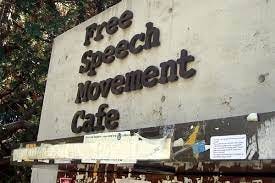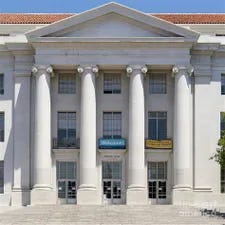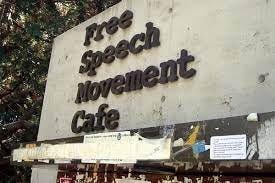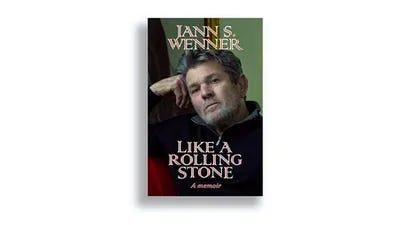Part II: The Free Speech
The UC Berkeley Chris Boskin Deans’ Speaker Series is free, with complimentary food and drink at the reception.
Open to all students, faculty, alumni, and infiltrators—anyone who can find it.
*
The “free speech”—where is it?
A long walk up, from the commons to the citadel, with no direction.
Somewhere up in the acropolis hills, inside a hulking “ziggurat,” as Greil Marcus would later call it. The towering university complex known as the Haas School of Business, where the Deans’ Speaker Series is cloistered.
The Haas school of economics sits half a mile from her twin temple—the institution cosponsoring tonight’s event, the Graduate School of Journalism.
The Greek Theater—financed by William Randolph Hearst, christened by a performance of Aristophanes’ “The Birds” in 1903 and soiled by the Jefferson Airplane in 1966—lies halfway between.
Viewed from above, the three structures describe a vast triangle of business, art, and journalism.
In search of that triangle, wandering power-struck through the colossal columns and pediments of Sproul Plaza, I paused before some myth-rich eatery named, The Free Speech Movement Cafe. Where I gaped and wondered…
What does the food taste like?
At length, I found Marcus’ ziggurat on the hill. A professorial hipster with an apparent sense of direction served as my guide. He led me to the base of the structure, where I shadowed him through glass doors and up an elevator shaft, to the inner chamber.
In the speaking forum, on the third floor of Haas, perspiring in an old Stax Records t-shirt, I noticed I was underdressed. So I went to cool off on the balcony with the rising moon—old, a sliver, against the dipping sun…
When I heard music.
*
“Once upon a time you dressed so fine, threw the bums a dime, in your prime…didn’t yooooou?” It was Bob Dylan, announcing the proceedings, sirening us to our seats. Chanting the rhetorical question that inspired the title of Jann Wenner’s old magazine, and now a new book of memoirs, Like a Rolling Stone.
A phalanx of promotional copies were arrayed like paper sentries at the door, putting the book at the vanguard of tonight’s conversation about Jann and Greil and Berkeley and Rolling Stone, and Free Speech.
While Dylan chimed and the audience settled, I eavesdropped.
A woman in front of me confided that this was her second speaking engagement in as many months. A groupie.
She’d just attended the former First Lady’s in San Francisco (which at $350-a-ticket cost considerably more than Jann Wenner’s).
“I went to hear Michelle Obama—my treat to myself,” she cooed. “She was won-derful,”
I tuned my ears to the man behind me, who was asking his wife a question.
“The Deans’ Speaker Series? What the hell is that?” (The title is projected onto a large screen behind the stage.) “As in… it’s the Dean’s series, hosted by the dean? They put the apostrophe in the wrong place…”
“Maybe there’s more than one dean,” his wife explained.
Indeed there are two Deans of Journalism, here at the Deans’ Series. A third dean introduces our guests.
“Good evening everyone, I’m Anne Harrison, of the Haas School of Business….”
We’re rolling; the event is recorded live, for Youtube.
*
“I came here to go to business school, and all we ever do is talk about this goddam Free Speech Movement!”
Greil Marcus is quoting his cousin, complaining about the protests that engulfed Sproul Plaza beginning in 1964, the year that Marcus and Wenner met. An amusing anecdote that probably has a subtext, given the way Marcus weighs words.
The irony, I begin to see, is that I came here to talk about the Free Speech Movement, and we’re sitting in a goddam business school.
The Free Speech Movement (FSM) coalesced at, “a time when this campus, and ultimately this country, was just going to split apart,” Marcus explains. Activists, debutantes, and people like Greil Marcus’ cousin all found themselves neck-deep in First Amendment radicalism… aimed squarely at university administrators.
In the present, golden Age of Administrators—deans of equity, deans of inclusion, deans of diversity; deans of admission, faculty, health-and-safety, and COVID compliance… exotic new colonies of state-enriched bureaucrats, booming like mushrooms after a warm autumn rain—I’m suddenly reminded of the comment I overheard earlier, regarding the punctuation of the “Chris Boskin Deans’ Speakers Series.”
The title is still projected onto a large screen behind the stage.
Marcus describes college administration in the 1960s, as “an administration that had no idea what was happening, they had no idea how to handle it, they were striking out blindly, trying to defend the rules for no good reason other than to preserve their authority. That was the moment it began.”
The catalyst for the Free Speech Movement.
Administrators took repeated action to assuage the FSM protests and maintain their veneer of authority. Each action was progressively “stupider and stupider” than the last, as Jann Wenner recalls. A befuddled establishment, faced with an atmosphere that was “part political radical… part drugs, part music,” and utterly beyond their comprehension or control.
The protestant environment became an incubator for the Freedom Riders, who organized out of Berkeley and other Bay Area schools, busloads of students headed South to fight segregation.
A similar atmosphere was fomented by McCarthy hearings in San Francisco in 1960. Where protests were staged outside the courthouse against the House Un-American Activities Committee (HUAC)—“We’re gonna have them again, by the way,” Wenner remarks obliquely.
Whether he means the hearings or the protests, Wenner doesn’t elaborate.
He does mention, cryptically, that the mood in 1964 was politically radical, “in a different way than those words may mean now.” A reference to Visigoths in the Capitol, or arsonists outside the Police Union, perhaps both… “political radical.”
What may those words mean now? It’s worth a look back, because “it began here,” Wenner says—not at Columbia, at Berkeley. Where the Free Speech Movement set the tone for Rolling Stone magazine.
“Its real origins are here on this campus,” Wenner says, the cradle of his acquaintance “with drugs and rock n’ roll,” and old friend Greil.
*
Earlier, when the elder spokesmen were taking their seats, Marcus reflected on the staying power of the song that accompanied them onstage. That namesake lyric, “Like a Rolling Stone,” by Bob Dylan.
From the old testament proverb, channeled by Muddy Waters, that inspired a band, a ballad, and a magazine name.
Marcus opened with a passage from Wenner’s memoirs—oral prose poetry, a sermon of the underground. A natural rap transcribed from conversation between Greil and Jann, that found its way into two books—one by Jann, one by Greil—each inspired by Dylan’s song.
Merging Dylan’s “Like a Rolling Stone” with his own, Jann Wenner rhapsodizes life at Berkeley in the mid-sixties, in his memoir, Like a Rolling Stone:
The song is about discovering what was actually going on around you, realizing that life isn’t all that you’ve been told that it is. You’re liberated, from your false knowledge and hang-ups.
But that’s frightening, and you have to face that. Suddenly you’re scrounging for your next meal but, say, do you wanna make a deal? But there’s… there’s fear in that, Do you want to make a deal? In that melody, in that voice, there’s fear all over it.
And the key line is, “You’re invisible now, you got no secrets to conceal.” Everything has been stripped away, and you’re on your own, there’s nothing to hide. You’re alone with no direction home. But you’re free. That was the message.
It was a song of innocence and experience…
I always thought it was my story. I used to go to the finest schools, nobody ever taught me how to live out on the street. Now, all of a sudden I was on the streets of Berkeley, in a world of radicals, Hells Angels, harmonica queens, drug dealers, dope kings, and one of them called the Mystery Tramp? And then I’m at an Acid Test, and some stranger with a top hat comes up to me and I stare into the vacuum of his eyes, and he asked, “Do you wanna make a deal?”
That happened to me. Many times.
A choice excerpt, and funny. Combining Dylan’s song of innocence and experience with Jann Wenner’s and William Blake’s, bringing it all back home to Berkeley. And finally, to the irresistible punchline, real life: “That happened to me.”
The audience can’t resist a laugh, but Wenner’s lyric dramatizes a serious paradox at the heart of American freedom. It’s palpable tonight—in the speaking room of Haas Business, and over at the J-school, on stage at the Greek, and out in the Berkeley streets.
All across the ether-laden land: the fear in it.
Radical freedom is intoxicating… but terrifying. Pure, unadulterated freedom—of speech, songs, lifestyle—is intense. A good trip, or bad. “There’s fear all over it,” these songs of freedom.
Jann Wenner sings himself—or Milo Yiannopoulus—at Berkeley.
Wenner sketches the contours of terrific freedom, in sixties California. Tracing an old revolutionary streak whose sentiments now appeal to a swathe of online protest movements across the country today… in large part thanks to the man describing them onstage.
As a podcaster once mused to Wenner, Rolling Stone was like the underground “internet” of its day. Appropriately enough, Wenner almost named the magazine The Electric Newspaper. The rebellious outlook of the Electric Newspaper, according to Wenner:
Now you weren’t buying into the system anymore. You weren’t buying into the fraternity system or the Ivy League system or any of those things you went to school for…you were being asked to upend all those assumptions and understand that you were going to throw away all the security of society and the certainties that were going with it…
A Great Leap of Faith—off the top of the ivory tower and into the revolution below.
*
Talk of Freedom and Fear led us naturally enough to Marcus and Wenner’s reflections on the Free Speech Movement. Now, it leads to talk of Fear and Loathing.
Marcus turns to the tragic hero in the founding-myth, “probably the most famous or celebrated writer to come out of the pages of Rolling Stone,” Hunter S. Thompson.
“Someone I never met,” Marcus says, but who came to define the magazine and the culture at large. Someone whose cartoonish image eventually eclipsed his existence as a writer, in the estimation of Marcus, Wenner, and many others. But in his prime, Thompson’s reporting on the 1972 Nixon-McGovern campaign helped put Rolling Stone, as Wenner says, “in the first ranks of American publication.”
As much as John Lennon, Thompson was crucial to the magazine’s early success, a friend.
The moderator introduces the subject of Hunter S. Thompson with a subtle question, inviting comparisons between then and now. Somewhat recently, Marcus has reread Thompson’s Fear and Loathing in Las Vegas: A Savage Journey to the Heart of the American Dream.
When it first came out in 1970…it was overwhelming. I mean it was probably the most fun thing I ever read, and it stayed fun until the last pages. But when I reread it a couple of years ago it struck me as so sad. As such a tragedy. It reminded me so much of The Great Gatsby, at the very end it was all an elegy. It was all, you know…the time to find what we were looking for has passed, we’re never going get there. And I’d like to hear what you thought, when you first read that, and what you think now.
“It was elegiac,” Wenner thinks…
He had decided in 1970 that this great burst of idealism in the sixties was not going to work out. And that the last great chance to transform society was like a wave and it had broken in the sixties and had washed out. I mean, ah… Hunter’s vision of that was partly true, partly not true, and… Hunter liked apocalypse and doom as a theme. And, you know, it’s hard to say why he came to that conclusion. After that we sent him on the campaign trail to cover the election, which started out as certainly an exercise—the ‘72 campaign between Nixon and McGovern—in optimism and hope, and of course crashed, you know, in ah… complete doom.
Only later would I recall Thompson’s epiphany on that campaign trail, about the contradiction at the heart of American character. Reflected in the two candidates, George McGovern and Richard Nixon. The avatars of Hope and Doom:
There is an almost Yin/Yang clarity in the difference between the two men, a contrast so stark that it would be hard to find any two better models in the national politics arena for the legendary duality—the congenital Split Personality and polarized instincts—that almost everybody except Americans has long since taken for granted as the key to our national character…
A Jekyll and Hyde quality that exists not only in the collective, but in the individual heart.
Certainly in the breast of Hunter S. Thompson, as his first wife realized. “The boy was loving, generous. The man was vicious,” she explained. His second wife confirmed that “Hunter had two extremes, which he lived within constantly. The generous beautiful Hunter, and this very mean cruel Hunter. And he was aware of both.”
Two sides to the elegist of hope, the prophet of doom. Hunter S. Thompson…
John the Revelator in the book of Rolling Stone.
*
If Wenner sees the sixties ethos as doomed, outside of discussion of Hunter S. Thompson, he doesn’t let on much.
He projects an idealist’s optimism, after all these years, a willingness to wait out the historical cycles between progression and reaction, growth and recession, the ups and downs of political and economic fortune, which begin to sound like his central metaphor for life, the rolling stone.
Even now, he has high hopes for the Biden administration, a free press and the First Amendment, for psychedelic enlightenment, for the energy and climate crises. We’re on an upturn, gathering no moss… no “bullshit.”
On the other hand, “in a hundred years we’ll all be living in one of two parts of the globe, the north or the south pole,” Jann the Revelator says.
“The rest will be a desert,” if we don’t get our arms around climate change…
But we probably will, he thinks, with the right kind of political leadership.
Weighed in the balance, an overall sanguine outlook is not found wanting in Jann Wenner. It outweighs any creeping pessimism in the face of Greil’s, or the audience’s, questions.
Thanks for reading the Third Ear! Enjoy your second helping? Stay tuned for the next round of Rolling Stone at “The Free Speech Cafe.”
Have friends with similar tastes? Share!








